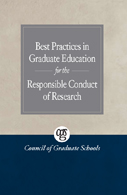You are on CGS' Legacy Site.
Thank you for visiting CGS! You are currently using CGS' legacy site, which is no longer supported. For up-to-date information, including publications purchasing and meeting information, please visit cgsnet.org.
In 2006, the Council of Graduate Schools received a two-year grant from the National Science Foundation (NSF) to fund Ethics Education in Science and Engineering programs at eight of its member institutions to develop interdisciplinary research-ethics programs for graduate students (2006-2008). This project built upon an existing CGS initiative, funded by the Office of Research Integrity (ORI), whereby ten institutions were given awards to develop training programs in the responsible conduct of research (RCR) for graduate students in the behavioral and biomedical sciences. The NSF-funded project incorporated and expanded what is being learned in that initiative.
Through the NSF project CGS sought to make training of graduate students in RCR a regular feature of graduate education. The project advanced this goal by adding students in science and engineering to the cohort of students currently being reached by CGS-supported RCR projects.
This new cohort of students was required not just to understand the professional standards of their disciplines, but to recognize, articulate, and deliberate ethical issues that arise in interdisciplinary research and in public-policy arenas. Assessment strategies for the NSF project included measurement both of individual ethical development and of the ethical climate of the research units involved.
The project resulted in a monograph, Best Practices in Graduate Education for the Responsible Conduct of Research, which identified best practices in the development of research ethics programs for graduate students in science and engineering.
Resources
 Best Practices in Graduate Education for the Responsible Conduct of Research (2009)
Best Practices in Graduate Education for the Responsible Conduct of Research (2009)
This publication documents the results of a collaborative project, supported by a grant from NSF, between CGS and eight universities to identify best practices in the development of research ethics programs for graduate students in science and engineering. Topics addressed include curricular approaches, program sustainability, considerations specific to master’s-focused institutions, and assessment.
Best Practices in RCR Awardees and Affiliates
Contact




